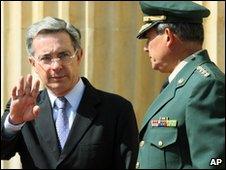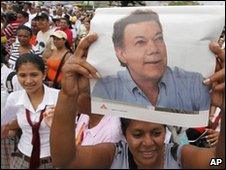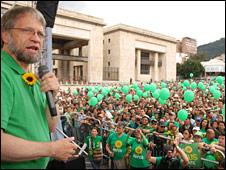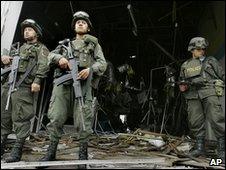Alvaro Uribe casts long shadow over Colombia election
- Published

Alvaro Uribe enjoys high approval ratings after eight years in office
Several weeks ago it was assumed that if Colombian President Alvaro Uribe did not run for a third term, his anointed successor and former Defence Minister, Juan Manuel Santos, would easily be elected to succeed him.
Not now. The presidential election on 30 May is set to be a photo finish.
"It was only 70 days ago that Colombia thought that Uribe was going to be the next president," said Rafael Pardo, the Liberal Party candidate.
"Now the country faces a dilemma: a continuation of Uribe's politics or a fresh start."
All the polls indicate that the contest will go to a second round on 20 June, with most suggesting that Antanas Mockus of the Green Party will face Mr Santos in the second ballot.
This is hard to understand when one thinks that President Uribe still has approval ratings of 60% after almost eight years in power. His popularity can largely be attributed to his hard-line, US-backed security policies.
He has had great success. Marxist rebels, engaged in conflict with the Colombian state for more than four decades, have been driven deep into their mountain and jungle stronghold, their numbers halved.
Drug production is down and the brutal right-wing paramilitary militias have demobilised.
Mr Uribe pushed for a referendum on whether the constitution should again be change to allow him to stand for a third term. But on 26 February, the Constitutional Court banned any further re-election and Mr Santos launched his bid for the presidency.
Split field
President Uribe has been unable to transfer his popularity to Mr Santos, 58, or the unified political base with which he has governed.
The main pro-Uribe parties, the Conservatives, Cambio Radical and Mr Santos' Partido de la U, are all fielding their own candidates.

Juan Manuel Santos is identified with the Uribe government
"The Uribe government has been successful, nobody can deny that," said Maria Victoria Llorente of the Bogota-based think-tank Fundacion Ideas para la Paz.
"However it came at a cost, the dark side of the administration: paramilitarism, human rights abuses and illegal wiretapping. Santos is associated with this."
Mr Santos has inherited a series of scandals which are tainting him far worse than they have the president. The one that he had to shoulder as defence minister is that of the "false positives".
Within the army there was a "body bag" culture. Success was measured by the number of enemies killed in combat.
So some units of the army began to round up civilians, initially homeless people, who would turn up dead in remote parts of the countryside in rebel uniform, presented as guerrillas killed in combat.
Last year evidence emerged that unemployed men in the slums of Bogota were being offered work in the eastern province of Norte de Santander only to turn up dead, allegedly killed in combat with the army.
Now the attorney general's office is investigating more than 1300 cases of "false positives" involving more than 2,000 victims.
Pencil
Another scandal has been that of the secret police, the DAS, which answers to the president.
Some DAS members have admitted that there were illegal intercepts of telephone calls by senior magistrates, opposition politicians and journalists.
Mr Uribe has denied that he ordered the wire-tapping, but investigations are closing in on members of his inner circle in the presidential palace.

Antanas Mockus argues that he offers something different
Hence the appeal of Antanas Mockus, 58, twice mayor of Bogota, who promises to break with past political corruption.
The idea is intoxicating for Colombians tired of scandals and endemic corruption and this is reflected in his extraordinary and rapid rise in the polls.
Mr Mockus carries with him a pencil everywhere he goes on the campaign trail. It has become the symbol of his campaign.
"The next chapter of Colombia's history will be written with a pencil, not with blood," he insists.
In the University of Antioquia, a hot bed of left-wing thinking, Mr Mockus is greeted like a hero. The young make up a huge part of his following and if he wins it will be thanks to their enthusiasm. The students all carry pencils and wear green shirts.
In Bogota, a Santos campaign rally had a very different feel to it. It was held in the central landmark Tequendama hotel.
Here the crowd wore suits, there were flashing lights and multimedia presentations, all presided over by models who stood around the stage and distributed campaign T-shirts to the faithful.
Diego Ospina, who runs a small restaurant nearby, voiced his backing.
"Look everyone wants an honest government, but Colombia is at war and we need a war president, a man who can get things done. That man is Santos," he said.

Security remains a key concern for Colombians
Mr Santos comes from unrivalled political stock. His great-uncle was president, his grandfather one of the most prominent political commentators in the country.
He has a long and exceptional record in public office. His time as defence minister saw the rescue of 15 hostages from guerrilla hands, among them the former presidential candidate, Ingrid Betancourt.
The security situation is always at the back of any Colombian's mind. They do not want to return to the days of a decade earlier when the guerrillas were camped in the outskirts of the cities and kidnappings ran at eight a day.
Liberal Party candidate Rafael Pardo has accused the current government and Mr Santos of wanting to make the election about fear.
"They want to scare voters into believing that more of the same military approach is needed," he argues.
Given the closeness of the opinion polls, it seems Colombians favour both change and continuity. Sunday will show which they are ready to plump for.